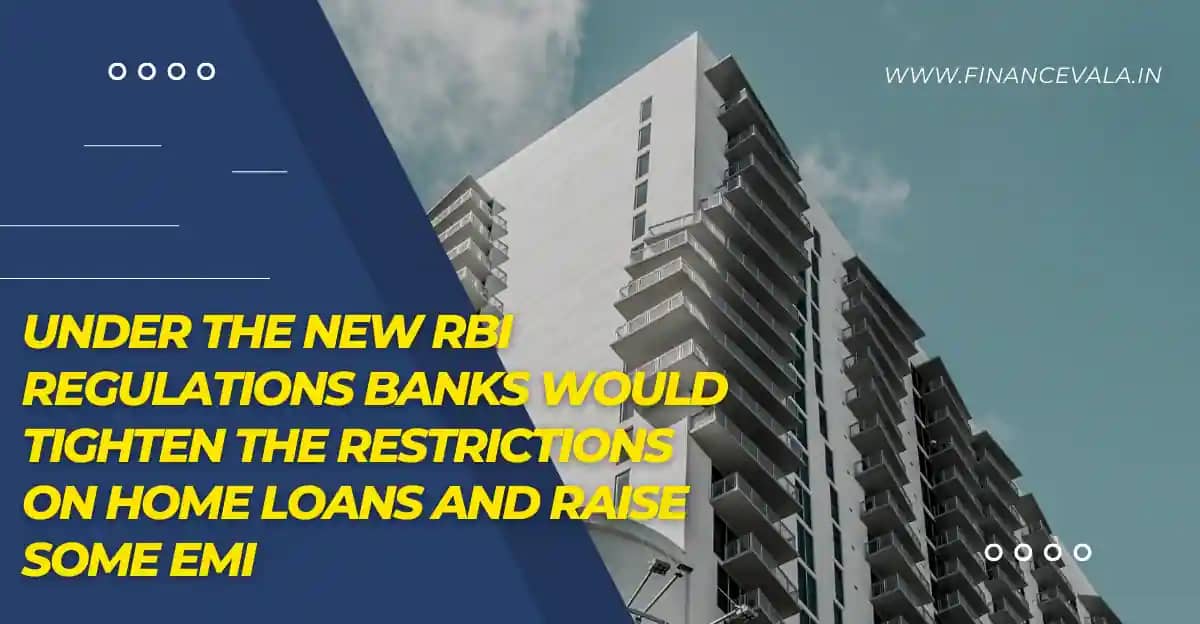Under The New RBI Regulations Banks Would Tighten The Restrictions On Home Loans And Raise Some EMI
Under The New RBI Regulations Banks Would Tighten The Restrictions On Home Loans And Raise Some EMI: When interest rates rise as a result of the RBI’s new regulations, borrower loan eligibility could decrease, and banks and finance businesses will be obliged to increase the EMI (equated monthly instalments) for some house loans. At the time of the interest rate reset, banks will now have to provide borrowers the option of switching to a fixed rate loan.

In the future, loan sanction letters will also need to include information about the fees involved in transferring a loan from a floating rate to a fixed rate at a later time. In the event of a sharp rate increase, lenders must make sure that the EMI continues to cover the loan’s monthly interest and that, once the EMI is paid, the loan balance does not grow above the amount from the previous month.
According to the RBI‘s circular on the reset of floating interest rates on EMI-based personal loans, lenders should not determine borrowers’ ability to repay based on current interest rates but rather should give headroom to ensure that borrowers can repay even if rates rise.
In the past, interest rates have fluctuated within a loan cycle by as much as six percentage points. Due to the fact that prolonging the EMI would generate additional interest, lenders have not always reset the EMI. The new standards mandate that lenders determine repayment capacity at a rate that is greater than the going rate.
People Also Love To Read: Is It Tax Deductible To Gifting Shares To Your Spouse?
Currently, banks use the current interest rates to determine a borrower’s capacity to repay. At an interest rate of 11%, however, this affordability would fall to Rs 72 lakh.
Due to the short-term nature of their deposits, the majority of banks do not now offer fixed rate loans. Senior banker claimed that there would be enough markup to cover interest rate concerns if they were obliged to give a fixed rate.
In order to ensure that there is sufficient headroom or margin available for extending the tenor and/or increasing the EMI, in the scenario of a potential increase in the outside benchmark rate during the tenor of the loan, regulated entities need to take into account the repayment capacity of borrowers, according to the RBI.
Also Read This: How To Use Apple Cash – Complete Guide For Apple Cash 2023
In response to concerns that banks would unnecessarily extend home loans after interest rates increased, RBI governor Shaktikanta Das announced last week that the central bank would review the EMI regulations.
According to him, banks will have to determine the suitable tenure after considering the borrower’s ability to make payments and how long that ability will remain based on his age. It will differ from person to person.
Additionally, excessive elongation must be avoided since it might occasionally mask the underlying tension in a given loan. As a result, the tenure extension must last for a fair amount of time. No definition is desired. It is a business choice made by the banks, according to Das.
Beginning on December 31, 2023, both new and existing borrowers will be subject to the new regulations. As lenders are required to reveal the amount of principal and interest recovered to date, the number of EMIs remaining, the amount of each EMI, and the annualized rate of interest for the duration of the loan, they will increase transparency.
People Also Like To Read: Finally Some Better News In The USA Brewing Market Correction
When determining a borrower’s eligibility in the past, lenders would take into account the rise in income and the cyclical nature of interest rates. However, there are now situations where pay scales in particular businesses don’t keep up with inflation. Additionally, banks in the West are preparing for ‘higher for longer’ interest rates.
Most lenders now concentrate on this sector to build their advances book because house loans are one of the major contributors to credit expansion. Finance businesses have been focusing on the affordable market segment, where there are many new credit customers who are unsure of the effects of rising rates, in an effort to increase the pie.
People Also Love To Read This: SBI क्रेडिट कार्ड से खाते में पैसे कैसे ट्रांसफर करें 2023
The RBI stated that these guidelines would apply similarly to all equated instalment-based loans with various periodicities “apart from the equated monthly instalment loans.” This suggests that the two main categories of long-term loans, loans against property and maybe education loans, will need lenders to tighten their standards.
